
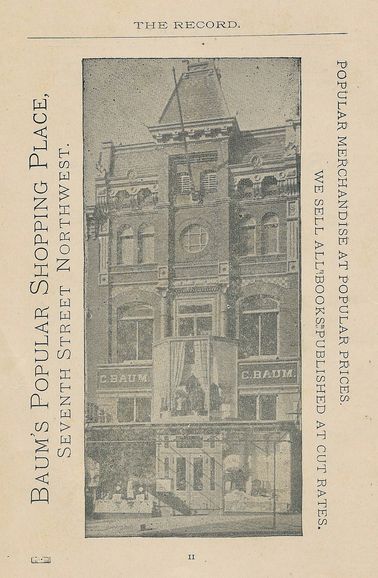
Baum's Popular Shopping Place
"Popular Merchandise at Popular Prices, We Sell All Books Published at Cut Rates";
dry goods, cloaks, millinery, men's furnishings, and bookseller, 416 7th NW
Contributed Dec 2011 by Susan Salus
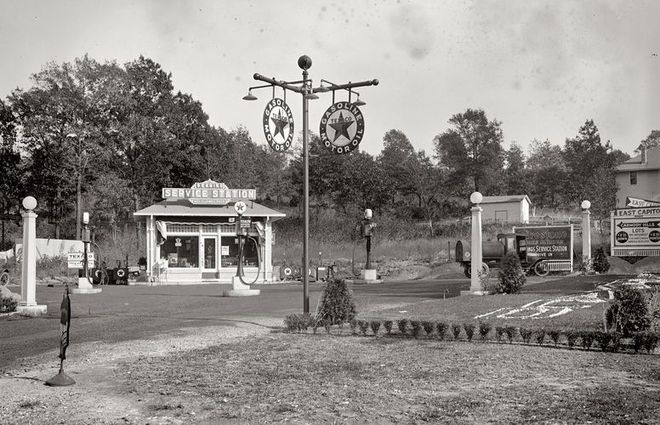
Benning Service Station
The Benning Texaco Service Station, with gas tanker truck at far right, as it looked in 1925. Proprietor was
George H. James. Exact location is unknown but probably off Benning Road.
Contributed Jun 2012 by Susan Salus
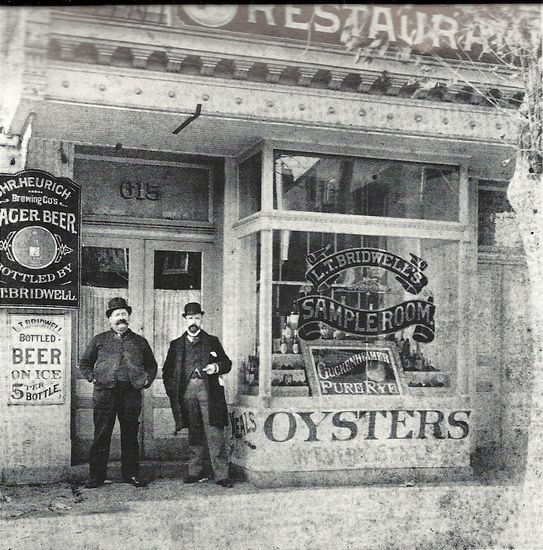
Bridwell Oysters
Lewis T. Bridwell operated a saloon and oyster bar on 7th Street, SW, during 1890-1891. This photo was taken
in 1890, probably after it first opened. The bottom of the plate glass reads "Oysters in Every Style." While
the two men are standing under the "615" street number, Bridwell's saloon was listed in old directories as
being at 621 7th street, SW, not 615. It is possible Lewis occupied four storefronts, from 615 to 621 7th
street, but that seems unlikely. The 615 address have previously been a grocery store and was a drug store
during 1889. By 1892, the oyster bar was no longer in operation; however, Lewis was working as a bottler and
either lived at or operated a bottlery from the 621 7th st, SW, address. Note that Bridwell proudly displayed
the sale of Christian Heurich's lager ale, "brewed by [?] T. Bridwell." The bottler may have been Lewis,
himself, or Lewis' father, Moses T. Bridwell. Moses had been in the ale and mead brewing and bottling
business for many years and operated from the 300 block of M St, SW. He likely played a role in establishing
and operating Lewis' saloon. Moses died in January 1892 and his death may have forced Lewis' saloon to close.
When his father, Moses, died in 1892, Lewis was forced to sell father’s
real estate holdings to settle his father’s debts. His father may have owned
the building housing Lewis’s oyster business. At any rate, after 1892, Moses
had given up his oyster restaurant and had taken over his father’s liquor
business. Also, the oyster business was seasonal; many who sold oysters also
had another profession to fall back on in summer months. Back then,
restaurants weren’t allowed to sell raw oysters during the height of the
summer months – May through August – due to poor refrigeration and
inadequate handling. The vibrio bacteria, prevalent in coastal waters, grew
rapidly in warm months and would become saturated in the oyster. While
cooking killed the bacteria, the cooking had to be prolonged. Today that
rule no longer applies since most oysters are farmed rather than taken from
the wild. In addition, there is adequate refrigeration and more stringent
regulations and monitoring are in place to reduce the possibility of
vibrio-infected oysters.
Contributed photo Jun 2012, 2nd paragraph added Sep 2024, by Susan Salus
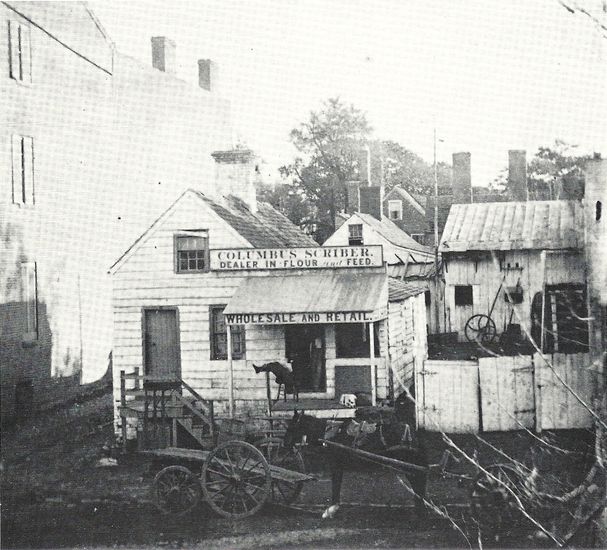
Columbus Scriber Flour
Columbus Scriber, a black man freed in 1853, owned the flour and feed store located 119 E St, SW. He is
seated on the porch of his business and was about 28 years old at the time of the photo (1863).
Contributed Jun 2012 by Susan Salus

Frankle & Co
"The Fair, 7th & H St NW, Housefurnishings"
Contributed Dec 2011 by Susan Salus
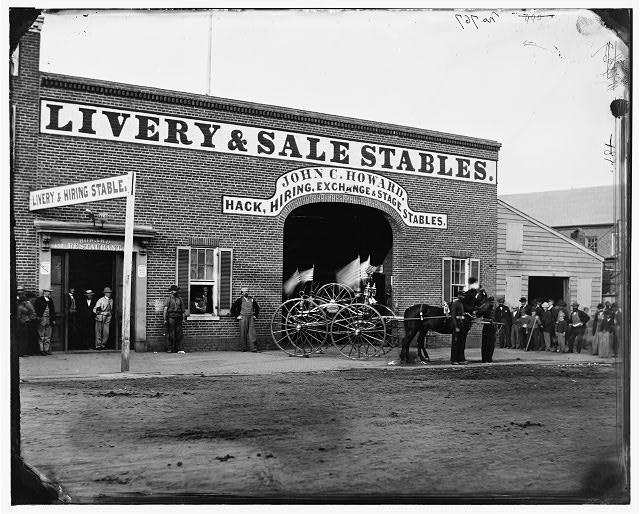
John Howard Livery Stables
John C. Howard's stable at 452-454 G Street, NW, as it looked in 1865. In front is a fire department hose
reel. To the left is the Howard Restaurant.
Contributed Jun 2012 by Susan Salus
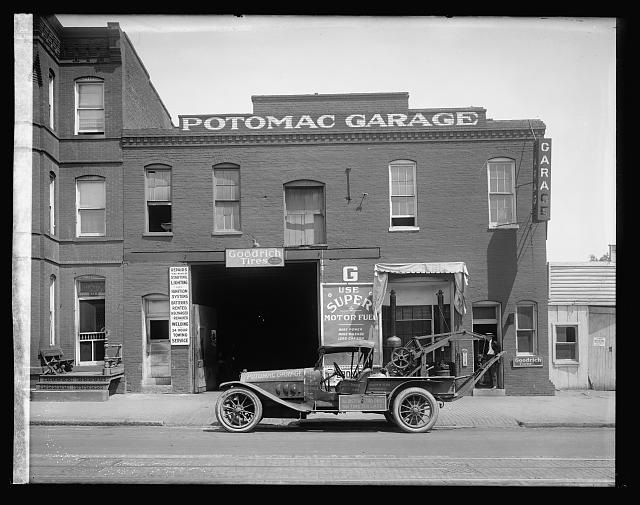
Potomac Garage
Potomac Garage with tow truck as it looked in 1921. It was located at 3307 M Street, NW, and was owned by
Paul D. Osmond, Aubrey H. Osmond, and Wallace R. Florence.
Contributed Jun 2012 by Susan Salus
Reeves Bakery
1209 F Street, NW, established by Sewell A. Reeves.
That address was long associated with grocers. From 1877 to 1894, George Kennedy maintained a grocery store there. By 1895, Kennedy had relocated his store and Nathan A. Poole took over the premises for his grocery store.
The next year, Sewell A. Reeves and John Poole were operating the grocery as the Poole and Reeves Company. On December 10 of that year, Sewell married Zoe E. Poole, no doubt related to Nathan or John Poole.
Poole and Reeves remained in business until 1898 when Reeves became the sole owner and redirected his business interests to include chocolate dipped candy and bakery products. Eventually, Reeves dropped the 'grocery' business altogether and operated only the candy store and bakery. Later, a lunch counter was added.
Sewell Reeves died December 4, 1941, at age 75. The bakery business was left to his son Algernon Poole Reeves. When Algernon died in 1962, his son John W. Reeves took over the bakery. In January 1966, John sold the business to the Four Boys Corporation, headed by George and Edward Abraham. The Reeves family retained ownership of the building. At the time the business was sold, many of the Reeves employees had worked there for years, some for more than 40 years, and Four Boys agreed to keep them employed. Four Boys eventually sold the business to Joseph Glorioso. Both Four Boys and Glorioso operated under the Reeves name.
The bakery-lunch counter continued operations at the F street address until 1988, when the Reeves heirs sold the building and land. But the bakery reopened in 1992, just about a block away at 1306 G Street, NW. Reeves remained there until June 8, 2007, when they were forced to close permanently since the landlord refused to renew the lease.
Reeves was known for their bakery products, especially their strawberry pies. Their famous chicken salad sandwich was served on their freshly baked thick-sliced baked bread. At Christmas, they offered glazed nuts for sale, a special treat.
While the old Reeves literature states the bakery began operations in 1886, the obituaries for Sewell and Algernon Reeves gave 1891 as the date of opening. However, the DC directories show 1896 as the first year of operation under the Reeves name.
Contributed Jan 2012 by Susan Salus
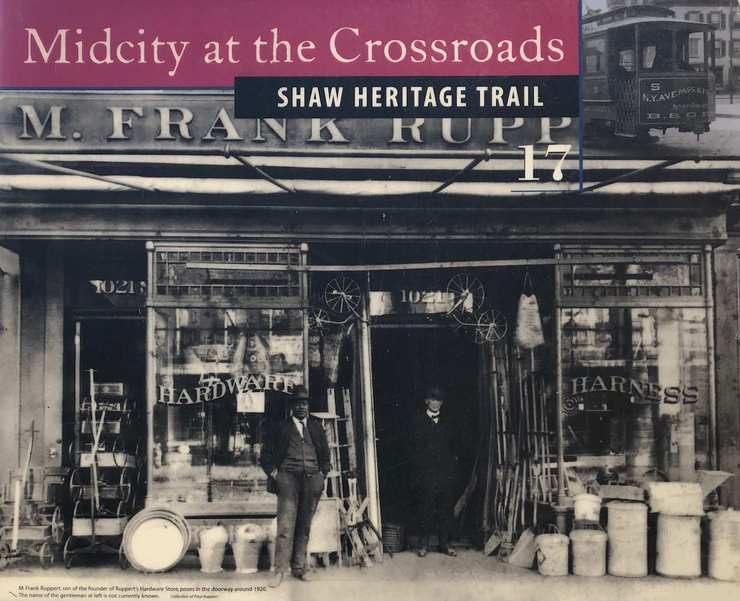
M. Frank Ruppert's Hardware
M. Frank Ruppert, son of the founder of Ruppert's Hardware Store, poses in the
doorway around 1920. The name of the gentleman on the left is unknown. (Photo
of a historical marker, downtown DC)
Contributed Jun 2020 by Ray Gurganus
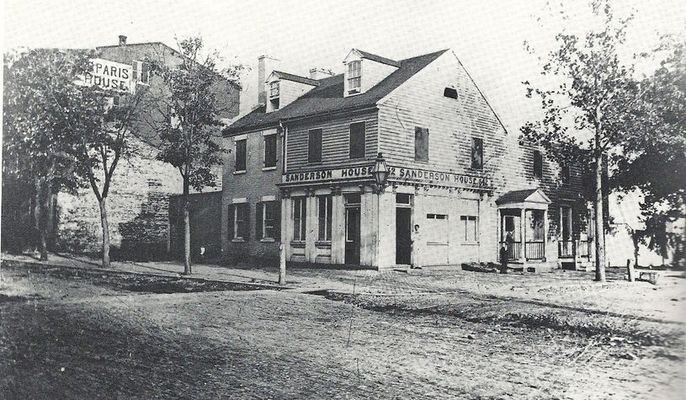
Sanderson House
The Sanderson House, located at 8th & L Sts, SE, near the Navy Yard, as it looked in 1866. It served
as a restaurant and hotel and was owned by William Sanderson. By 1870, the "Sanderson House" at 8th street
was no longer listed in old DC Directories, but one was listed on New Jersey Avenue at the corner
of A Street, SE. This was either a branch of the original or a complete relocation.
Contributed Jun 2012 by Susan Salus
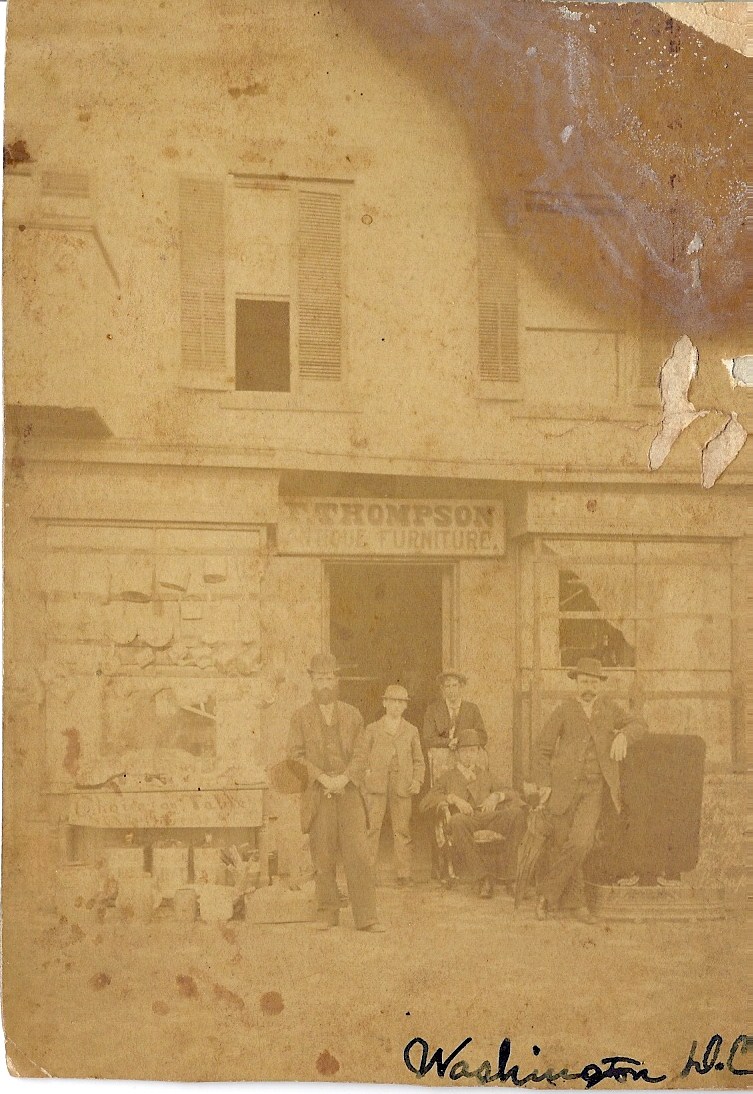
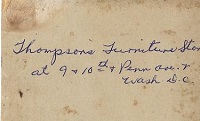 Thompsons Furniture Store, 9th
& 10th & Penn Ave, Washington DC.
Thompsons Furniture Store, 9th
& 10th & Penn Ave, Washington DC.
Frank Thompson is the man in front on the left, the small guy I think may be Arthur King, his nephew who lived with them and worked at the store.
The fellow in the chair may be Frank's son Fank and the fellow standing to the right is his father Thomas Thompson, a gold watch maker from London.
Contributed Feb 2012 by Jeanne
Copyright © 1996 - The USGenWeb® Project, DCGenWeb